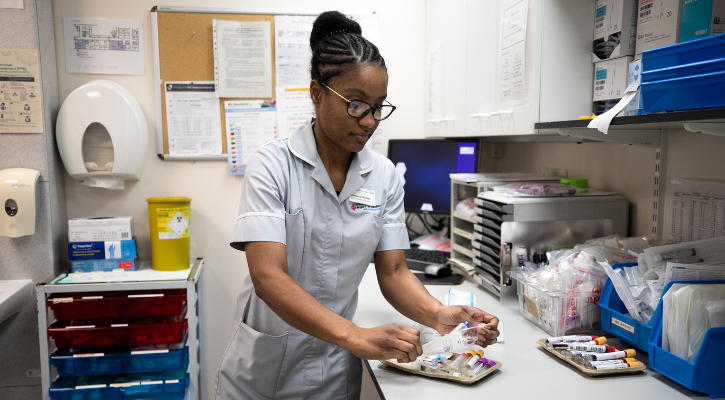The National Amyloidosis Centre at the Royal Free Hospital has been at the cutting edge of treatment and research into all aspects of amyloidosis for more than 25 years. Its highly specialised service has been providing diagnoses and care to amyloidosis patients locally and throughout the UK since 1999.
What is amyloidosis?
Amyloidosis is a rare disease caused by the abnormal deposition and accumulation of protein in the tissues of the body.
Amyloid deposits are primarily made up of protein fibres known as amyloid fibrils. These amyloid fibrils are formed when normally soluble body proteins clump together, and then remain in the tissues instead of safely going away. About 30 different proteins are known to form amyloid deposits in humans.
Amyloid deposits cause disease by gradually accumulating within organs and thereby disrupting tissue structure and damaging their function. In some cases, previously healthy organs can be substantially replaced by extensive amyloid deposits.
Organs that may be affected by amyloidosis include:
- kidneys
- heart
- liver and spleen
- nervous system
- gut and tongue
- bones and joints, especially the wrists
- skin
- blood vessels and clotting system
- eyes
There are many different types of amyloidosis. Each type has different causes, different symptoms and different treatments.
Referral letters for the general and AL amyloidosis service
Referral letters for the general and AL amyloidosis service should be addressed to one of the following consultants:
- Dr Oliver Cohen, consultant haematologist
- Professor Marianna Fontana, Hon consultant cardiologist
- Professor Julian Gillmore, Hon consultant nephrologist
- Dr Jahanzaib Khwaja, consultant haematologist
- Professor Helen Lachmann, Hon consultant nephrologist
- Dr Shameem Mahmood, consultant haematologist
- Dr Ana Martinez Naharro, consultant cardiologist
- Dr Sriram Ravichandran, consultant haematologist
- Dr Lucia Venneri, consultant cardiologist
- Professor Ashutosh Wechalekar, Hon consultant haematologist
- Dr Carol Whelan, consultant cardiologist
Please include the following details in the referral
- Patient contact details, including full address, email, and telephone number(s).
- If an interpreter is needed and the required language.
- Name and full contact details of referring consultant and/or GP.
- Any recent biopsies including bone marrow (date and hospital where performed) and a copy of the final biopsy report.
- Results of previous imaging (date and hospital where performed) and a copy of the final report:
- Echocardiogram, DPD or other bone scans, Cardiac MRI, CT or CT PET scan results, Skeletal survey.
- Details of any implanted metal work or devices such as pacemakers or ICD and if they are CMR compatible.
- If the patient has organ failure, details of dialysis or organ transplantation.
- Relevant blood tests, in particular:
- Serum immunoglobulins, serum, and urine electrophoresis and immunofixation and serum free light chain assays
- Renal and liver function, quantification of proteinuria
- Cardiac biomarkers such as NT pro-BNP and troponin T
Previous bloods which assess chronic inflammation such as CRP, ESR and WBC if inflammatory disorders are suspected.
Referral for patients with ATTR cardiac amyloidosis to be considered for tafamidis treatment
Referral letters for the TTR service
Should be addressed to one of the following consultants:
- Professor Marianna Fontana, Hon consultant cardiologist
- Professor Julian Gillmore, Hon consultant nephrologist
- Dr Ana Martinez Naharro, consultant cardiologist
- Dr Lucia Venneri, consultant cardiologist
- Dr Carol Whelan, consultant cardiologist
Please include all the following details in the referral
- Patient contact details, including full address, email, and telephone number(s).
- If an interpreter is needed and the required language.
- Name and full contact details of referring consultant and GP (including GP postcode).
- Latest clinic letter with comorbidities and medication.
- Latest blood tests
- renal profile (actual results and date)
- liver profile (actual results and date)
- NT-proBNP (actual results and date)
- Serum immunoglobulins, serum electrophoresis and immunofixation (actual results and date)
- Urine electrophoresis and immunofixation (actual results and date)
- Serum free light chain results (actual results and date)
- Confirmation that biopsy diagnosis has already been made with amyloid typing performed at NAC or if biopsy performed within last 5 years but not typed at NAC - biopsy site, date of biopsy, and hospital where performed and a copy of the final biopsy report.
- Results of previous imaging (date and hospital where performed) and a copy of the final report:
- latest Echocardiogram (report in full and date)
- DPD or other bone scans (report in full with Perugini grade and date)
- latest Cardiac MRI if performed (report in full and date)
- TTR genotype (report in full if not done at NAC).
Provision of the full data set in the referral will enable early assessment, potentially via remote consultation and prescription of tafamidis to eligible patients.
Referral for genetic counselling around hereditary amyloidosis
We are currently accepting referrals for both individuals diagnosed with a hereditary form of amyloidosis who wish to discuss their diagnosis, and individuals with a family history of a hereditary form of amyloidosis who wish to discuss predictive testing.
Referral for genetic counselling should be addressed to: Emily Dixon, Principal Genetic Counsellor
Please include the following details in the referral:
- Patient contact details, including full address, email, and telephone number(s).
- If an interpreter is needed and the required language.
- Name and full contact details of referring consultant and GP (including GP postcode).
- If the patient already has a genetic result, please confirm if they are a patient of the NAC or if the testing was done elsewhere (e.g. abroad).
- If you a referring a patient for predictive genetic testing, please enclose full details of the affected individual in the family such as: name, date of birth, NHS number, hospitals where they were/are investigated or treated. If a family member has not been seen at the NAC, their genetic report and/or a clinic letter showing they have a hereditary form is highly recommended. Referrals that do not include this information may be rejected.
Send all referrals to
National Amyloidosis Centre
Royal Free London NHS Foundation Trust
Pond Street
London
NW3 2QG
Email: rf-tr.amyloidosis-admin@nhs.net
Appointment availability
Tel: 020 7433 2800
Email: rf-tr.
If you wish to discuss any clinical issues prior to the referral, please contact the amyloid centre nurse help line: 07790 989 695
The service does not provide emergency, nor routine secondary care and all patients must remain under shared care arrangements with their local referring teams.
Diagnostic Genetic testing
Can be requested directly without a clinical referral using Genetics testing service.
Cerebral amyloid angiopathy
Please note that the NAC does not have expertise in the investigation/management of cerebral amyloid angiopathy. If that is the suspected diagnosis, please consider referral to:
Professor David Werring
Comprehensive stroke service,
National hospital for neurology and neurosurgery
Queens Square
London
WC1 N3BG.
Email: uclh.
Our clinical evaluation usually takes one to two days, and hospital or hotel overnight accommodation can be arranged where necessary.
We recommend you bring a family member or friend with you if possible. There is a lot of information to take in and it will help to have someone with you to support you and help you. The evaluation includes:
- blood and urine tests
- ECG (electrocardiogram to check your heart’s rhythm and electrical activity) and echocardiogram (ultrasound scan of the heart)
- whole body SAP scan to establish the distribution and quantity of amyloid deposits
- additional tests in some patients may include:
- abdominal fat biopsy
- bone marrow biopsy
- DPD scan of the heart
- cardiac MRI scan
- physician evaluation
- specialist nurse consultation
The doctor who evaluates you will explain your diagnosis and make recommendations regarding a suitable treatment plan. The specialist nurses explain and discuss practical nursing issues during the initial evaluation and are available afterwards for patients and relatives to contact with any questions that arise.
Our approach to each patient with amyloidosis is tailored individually to the type of amyloid and to patients’ particular problems.
Having a SAP scan
The safe, painless SAP scan enables doctors at the National Amyloidosis Centre to pinpoint the location and amount of amyloid within your body’s organs without the need for a biopsy (where a sample of tissue is taken from the body).
This routine clinical test was developed by Professor Sir Mark Pepys and Professor Philip Hawkins at the centre in 1987 to provide an assessment of both the initial extent of each patient’s amyloidosis and how it changes over time.
It is the only existing method for non-invasive diagnosis and comprehensive follow up of total body amyloidosis. The National Amyloidosis Centre is the only place in the world where the SAP scan is routinely available.
Serum amyloid P component (SAP) is a normal blood protein, present in everybody.
In healthy people there are very small quantities of SAP, and it is only present inside the bloodstream, but not in the organs.
In the bodies of patients with amyloidosis, in addition to the small quantities of SAP in the blood, there are large quantities of SAP coating the amyloid deposits in the organs. In the SAP scan, all of this coating shows up clearly, as if it has been highlighted, or labelled.
The test involves injection of a small amount of radioactive labelled human SAP as a tracer into a vein and then either that afternoon or the next day lying down for about 25 minutes for the scan. The camera is silent and takes pictures from your head to your knees. It is not enclosed, so claustrophobia is not usually a problem.
Your amyloidosis treatment
Following assessment for amyloidosis at our centre, treatment is usually given at your local hospital or regional centre in conjunction with advice from the National Amyloidosis Centre (NAC). Most patients with amyloidosis need long term surveillance, including follow-up visits at the NAC.
Read treatment information for the different types of amyloidosis.
Clinical trials at the National Amyloidosis Centre
The NAC is very active in research and therapy trials in different types of amyloidosis. The studies we can offer depend on which are currently recruiting and eligibility requirements. Please speak to your nurse or doctor if you would like to find out more.
Amyloidosis Research Fund
If you would like to support research into amyloidosis or patient-related activities of the NAC, our charitable fund is managed by the Royal Free Charity and you can make a donation or take part in fundraising for us. Every penny is received with sincere gratitude and is used for amyloidosis research and education.
Amyloidosis is a rare disease. Most people have never heard of it until they or their family member or friend is diagnosed. Many doctors know little about the condition. Patients, friends, family and carers often have many questions.
On this page, you will find patient information videos and details of patient support groups you can join.
Patients are at the heart of everything we do at the National Amyloidosis Centre. We want to continue to improve both the clinical care we provide and our patients’ overall experience.
We aim to do this by listening to what our patients tell us and by putting their suggestions into practice. If you have any feedback about our services, please email rf.
Patient support groups
Myeloma UK groups — for patients with AL amyloidosis
The charity Myeloma UK welcomes patients with AL amyloidosis at support groups in around 60 locations around the UK — read more information on Myeloma UK.
The UK ATTR Amyloidosis Patients’ Association (UKATPA)
This charity was founded in 2017 by a group of UK patients with transthyretin (TTR) systemic amyloidosis (ATTR) to:
- provide support and information for patients with ATTR amyloidosis
- involve patients in all aspects of management and research
- work closely with the National Amyloidosis Centre to promote interdisciplinary communication with local doctors treating ATTR patients throughout the UK
This service has received grant funding from the Royal Free Charity.
Partnerships
Executive summaries of working agreements can be found below.
Executive summary
Alnylam and the NAC will enter a collaboration (Joint Working Agreement (JWA)) to increase the availability of genetic counselling in line with consensus on best practice to (i) all patients diagnosed with a hereditary amyloidosis gene variant (“Index Patients”) and (ii) relatives of the individuals above, regardless of whether they also have been diagnosed with a gene variant. The genetic counsellor funded under this joint working will provide support and advice to patients and their relatives. This support and advice will primarily relate to family cascade screening, implications for relatives, and information on hereditary amyloidosis disease management and relevant NHS services. The genetic counsellor will not recommend, advise or discuss individual available treatments.
In addition, this JWA will increase the capacity of the NAC to process genetic tests for hereditary amyloidosis gene variants. It is expected that the number of requests for genetic tests for an amyloidogenic gene variant will increase as a result of the increased availability of genetic counselling established by this joint working project. Alnylam will fund an additional lab technician at the NAC to assist with the processing and analysis of the increased number of requests for genetic tests for an amyloidogenic gene variant.
The project will commence in November 2023. The project term is 37 months. A short summary of outcomes and lessons learned will be published collaboratively by the NAC and Alnylam.
Expected benefits to patients, the NAC and Alnylam Patients
It is expected that patients diagnosed with an amyloidogenic gene variant will benefit from improved experiences through the provision of support, advice and information in relation to the diagnosis and its implications. The families of patients diagnosed with an amyloidosis gene variant will also benefit from support, advice and information regarding the potential implications of this diagnosis and this may lead to earlier diagnosis of family members with hereditary amyloidosis. It is expected that the experience of all individuals who undergo genetic testing for an amyloidogenic gene variant will be improved by ensuring that there are fewer delays in receiving the results of tests.
NAC
The NAC will benefit from an increased ability to meet expert opinion consensus on best practice in relation to hereditary amyloidosis. The NAC will also benefit from an increased capacity to process requests for genetic tests for an amyloidogenic gene variant. In addition to this, the project is expected to provide the NAC with some data to support a business case to be presented to RFL Trust and NHS England for the future funding of a permanent genetic counsellor and for future funding of genetic testing capacity at the NAC.
Alnylam
Alnylam is expected to benefit through the potential earlier diagnosis of hATTR patients.
Background
Cardiac amyloidosis (CA) is a progressive infiltrative heart muscle disease, caused by the accumulation of insoluble amyloid fibrils in the heart muscle (myocardium). The resulting cardiomyopathy eventually progresses to endstage heart failure. Life expectancy without access to specialised treatment is poor.
Project
The objective of the project is to improve the care of patients with CA by accelerating the clinical review and optimisation of treatment, for patients with a confirmed diagnosis of CA, as assessed by an expert clinician at the NAC.
The project will run over a total of 12 months:
- To incorporate an initial 6-month period to triage and initiate appropriate treatment for eligible patients who are already diagnosed with CA.
- This will be followed by a 6-month period to establish best working practices for ongoing management of these patients.
Benefits:
1. Benefits to Patients:
- Improved access to expert review and specialised medicines and treatments.
- Specialist Healthcare support from National Amyloidosis Centre.
- Improved adherence to medicines through specialist nurse support.
- Improved outcomes for amyloid patients (e.g., improve decision making by specialist multidisciplinary team (MDT), access to expert diagnostics and experience in treatment decision making, direct links to NAC).
2. Benefits to NHS:
- Efficiency in NAC working practice to review patients in an accelerated manner reducing impact on wider NHS organisations.
- Maintain current NAC waiting times despite an increased number of patients requiring review.
- Sharing of best clinical practice across a future amyloid network.
3. Benefits to Pfizer:
- The project will result in the identification of patients who are eligible for appropriate treatment.
- Expected increase in the speed of uptake of licensed treatment for eligible patients.
- Increase understanding of service provision.
Outcomes
To deliver an accelerated clinical review of patients already diagnosed with cardiac amyloidosis (CA) and to establish best working practices for ongoing treatment.
Proposed term of the Collaborative Working Project:
Start date: 2nd September 2024
End date: 1st September 2025
Financial Arrangement
The National Amyloidosis Centre will contribute:
- Diagnostic support: £65,100.00
- Human resource support: 1,894 hours
- Pfizer UK Ltd will contribute: Clinical Nurse Specialist and Data administration funding: £110,608.00
- Human resource: 540 hours
Joint working between (1) the National Hospital for Neurology and Neurosurgery (NHNN), (2) the National Amyloidosis Centre (NAC) and (3) Alnylam UK Ltd (Alnylam) in relation to the development and implementation of a multidisciplinary team and service evaluation
Start Date and Duration:
15 November 2024 to 31 March 2026
Project Summary:
As part of the existing clinical process, patients diagnosed with hereditary transthyretin-mediated amyloidosis (hATTR) and with suspected peripheral neuropathy (Patients) at the NAC are referred by their managing health professional to the NHNN.
The joint working project will develop and implement a process to triage and then assess these Patients at a multidisciplinary team meeting. The project will also include an evaluation of the service pathway for diagnosis and treatment of hATTR in the UK (Service Evaluation).
Expected Benefits:
Anticipated benefits for Patients:
- Fewer but more effective and directed visits to hospitals.
- Better information on their condition and treatment options due to assessment being undertaken by experts in hATTR and peripheral neuropathy.
- Patient assessment is co-ordinated and more appropriately based on clinical need than under the current system. This in turn would provide patients with a better experience of the healthcare system.
- The development of a procedure to support earlier diagnosis of patients with hATTR.
Anticipated Benefits for NHNN:
- Opportunity to advance clinical understanding of hATTR and peripheral neuropathy alongside the specialist expertise at the NAC through discussion and evaluation of Patient cases.
- Opportunity to increase the capacity of the NHNN to assess Patients based on clinical need within a shorter timeframe.
- Opportunity to improve the service for hATTR patients across neurology/neuropathy care including at the NHNN.
- If deemed necessary, provide data to support a business case to be shared with NHS England (or other relevant decision-making body agreed by the Parties) to improve the provision of neurology/peripheral nerve clinical input into the care of patients with hATTR under the care of the NAC.
Anticipated Benefits for the NAC:
- Opportunity to advance clinical understanding of hATTR and peripheral neuropathy alongside the specialist expertise at the NHNN through discussion and evaluation of Patient cases.
- If deemed necessary, provide data to support a business case to be shared with NHS England (or other relevant decision-making body agreed by the Parties) to improve the provision of neurology/peripheral nerve clinical input into the care of patients with hATTR under the care of the NAC.
- Service Evaluation will provide data to the NAC which may be useful for its operations.
Anticipated Benefits for Alnylam:
- Alnylam is expected to benefit through the potential earlier diagnosis of hATTR patients with polyneuropathy.
- Improvement in patient care through alignment with local or national guidelines
 Translate
Translate







